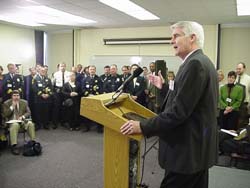Naperville, Ill., March 20, 2000 — Naperville, Ill., resident Mike Sullivan considers the Internet a great resource for helping his kids with their homework, a place where he can check out the latest news from the local newspapers, and a way to communicate via email with friends anywhere in the country. But when Detective Mike Sullivan goes to work each day at the Naperville Police Department, he uses the same technology and skills to fight newly emerging crimes like cyberstalking, software piracy, hacking and computer fraud.

Microsoft COO Bob Herbold talks to suburban Chicago law enforcement officers during the dedication of a new state-of-the-art Computer Crimes Lab at the College of DuPage, made possible by a donation from Microsoft and Omni Tech.
When Sullivan, a 20-year law enforcement veteran, added computer crimes to his job description in 1994 it took up about 25 percent of his time. Today, he spends 100 percent of his time on cybercrimes, and the police department has bolstered its efforts by adding five other officers who spend between 25 and 50 percent of their days fighting cybercrime as well.
For the past two years, Sullivan has taught the Computer Crimes Investigation course for the Suburban Law Enforcement Academy at the College of DuPage in Glen Ellyn, Ill., just west of Chicago. The academy’s computer classes draw senior police officers and police investigators from throughout the Midwest and the nation. To date, more than 200 officers have participated in the training, and 125 police chiefs have attended similar courses.
“At the turn of the last century, criminals moved from horses to cars and the police had to learn to use the new technology. Then in the 1940s, criminals started using telephones to commit crimes and the police had to adapt again,”
Sullivan said.
“Now, computers are the tools of modern-day criminals, and police officers need to become just as skilled at using this technology as the criminals — if not more so.”
Recognizing the need for government, law enforcement and technology industry leaders to work together to address the issue of cybercrime, U.S. Speaker of the House J. Dennis Hastert and Microsoft Chief Operating Officer Bob Herbold today dedicated a new state-of-the-art Computer Crimes Lab at the College of DuPage, provided by a $250,000 donation from Microsoft and Omni Tech Corp. The Computer Crimes Lab will allow the College of DuPage to expand its efforts to help officers learn to navigate the Internet, seize and search computers, and locate evidence needed for successful prosecution of cybercrimes. It will serve as a model for similar training programs in other communities around the nation.
“The Internet is an amazing place for all ages to learn, discover, communicate and collaborate; however, with more than 100 million Internet users today, new types of criminal activity are cropping up in this emerging electronic community,” Herbold said.”
Microsoft is committed to keeping the Internet a safe place for everyone — children, parents and entire communities — through our support of the new Computer Crimes Lab at the College of DuPage and a variety of other initiatives addressing issues such as ensuring that children are safe online, combating software piracy and protecting the privacy of Internet users.
“
In a letter of support for the college’s Suburban Law Enforcement Academy’s new Computer Crimes Lab, Hastert said: “Public-private partnerships, such as the one formed by Microsoft, Omni Tech and College of DuPage to support this lab, can provide officers with the training they need to combat the various kinds of criminal activity that are emerging on the Internet. I hope this lab will serve as a model for similar programs around the country.”
In addition to supporting the new Computer Crimes Lab at the College of DuPage, Herbold said, Microsoft also has instituted a hotline that law enforcement officials can use 24-hours-a-day, 7-days-a-week if they need immediate assistance in pursuing online criminals. Staffed by experts in law enforcement and investigative techniques, the hotline helps law enforcement officers determine how, when and where criminal activity may be occurring on or via Microsoft’s online services and what Microsoft can do to help.
To bolster its efforts to help ensure fun and safe online experiences for adults and children alike, Microsoft is committed to providing parents, teachers and caregivers the tools they need to teach online safety. For example:
-
Joining industry colleagues, Microsoft supports the GetNetWise initiative, an online resource designed to teach parents and caregivers how to help children have a safe, educational and fun online experience.
-
In cooperation with the Boys and Girls Clubs of America, Microsoft created a Stay Safe Online Certification Program that features a certification test for children to complete prior to going online at technology centers in the clubs.
-
Microsoft designed Kids Passport, a service that allows parents to determine whether their child may use online services that collect and/or disclose personal identification information.
-
Working with the Naperville Police Department’s Internet Crimes Unit, Microsoft helped create the Safekids Web site — complete with a presentation on Internet safety and a teacher’s training guide — to help parents and educators worldwide teach children the fundamentals of Internet safety.
“Close collaboration with key industry partners like Omni Tech, the government, nonprofit organizations, and the education community is an important part of Microsoft’s overall strategy for ensuring that the cyberhighways are safe for everyone,”
Herbold said.




